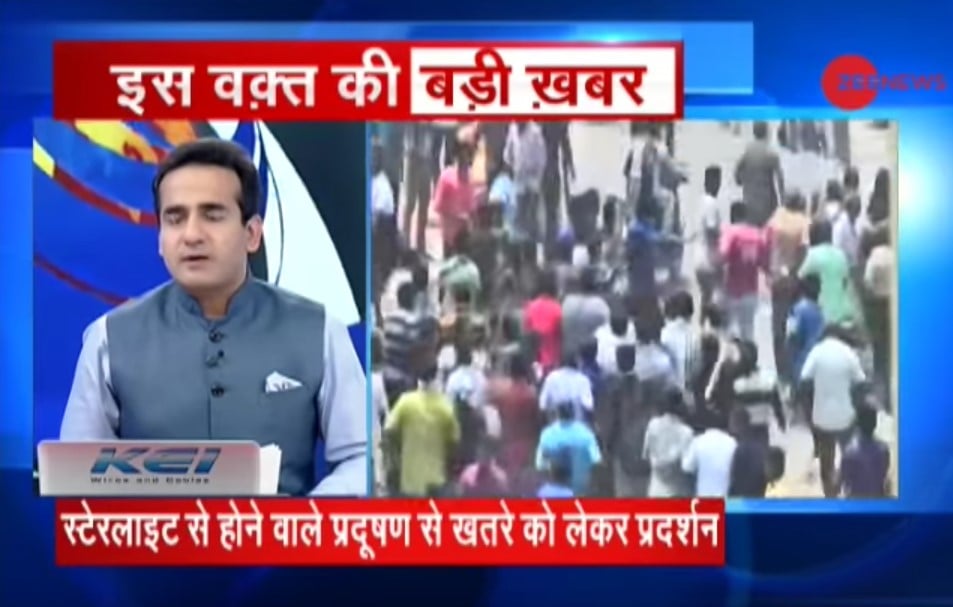Protests in Tamil Nadu’s Tuticorin turned violent over the closing of a copper plant. Police killed nine people during the anti-Sterlite protests after the British mining giant Vedanta Group’s Sterlite Copper plant was shut down over pollution concerns. The anti-Sterlite protests have been ongoing for three months now.
Chief Minister K Palaniswami confirmed that nine people died due to “police action.” Reports indicate that many more were injured, including police, as the anti-Sterlite protests turned violent. Officials claim 20 police officers were injured in the protests.
Palaniswami also announced a judicial inquiry into the violence and that compensation of 10 lakh (146,961 USD) will be paid out to families of the victims.
Anti-Sterlite Protest
Police claim 5000 protesters met outside a local church. After being barred from marching to the copper plant, the demonstrators decided to take their protest to district collectorate. According to Palaniswami, the protesters began setting public property and government vehicles on fire and throwing stones. Police claim more than 110 vehicles were burnt by protesters.
At first pushing and shoving broke out, but quickly escalated to protestors throwing stones at police and overturning a vehicle. Windshields of police vehicles were also shattered. The mob spiraled out of control as they began to attack banks. Police at first used batons and teargas to try to stifle the crowd, but as the protests spiraled out of control, they began firing into the mob, eventually killing nine people.
Palaniswami defended the police action saying, “The police had to take action under unavoidable circumstances to protect public life and property as the protestors resorted to repeated violence… police had to control the violence.”
3,000 reinforcements have been brought in from surrounding districts in an attempt to restore peace in Tuticorin. Senior officials from Chennai, the capital of Tamil Nadu to assess the situation and restore calm. Meanwhile, 20,000 people have marched to the copper plant demanding that the polluting plant remain closed permanently.
President of Congress, Rahul Gandhi, called the police killing of nine people in the Anti-Sterlite protests as, “state sponsored terrorism.” He tweeted, “The gunning down by the police of 9 people in the Sterlite protest in Tamil Nadu, is a brutal example of state sponsored terrorism. These citizens were murdered for protesting against injustice. My thoughts & prayers are with the families of these martyrs and the injured.”
MK Stalin, DMK Working President and Leader of the Opposition, called the police killings, “inhumane.” He demanded an inquiry from the high court, financial compensation to the families of those slain by police, and the removal of police chief TK Rajendiran. Stalin also demanded a permanent closure of the copper plant.
Legal Action
The copper plant was operating in Tuticorin for 20 years, but after a gas leak in 2013, it was ordered closed by then chief minister, J Jayalalithaa. The gas leak left hundreds with breathing difficulties, nausea, and throat infections. The company then moved the case to the National Green Tribunal, who overturned the government order for the closure of the plant. The state responded by taking the case to the Supreme Court. The petition is still pending in the Supreme Court.
Sterlite also made a petition this year to the Tamil Nadu Pollution Control Board (TNPCB). The TNPCB rejected the petition to reopen the plant over the failure of Sterlite to meet green norms including the disposal of copper waste. There have been concerns that the plant is contaminating groundwater and threatening the local fishing industry.
The London based Vedanta Group has not yet issued a public statement on the violence.
Pollution in India
Copper pollution is a concern mainly to agricultural and fishing industries. Copper in the water supply is toxic to fish, while it can also kill microorganisms in the soil needed to maintain nutrients for farming.
Meanwhile, pollution in India has been on the rise and called a humanitarian crisis, posing serious health risks and even death to India’s population. This year, India dominated the World Health Organization’s (WHO) list of most polluted cities, with 14 out of 20 cities on the list.




